The Democratic National Committee (DNC) is entertaining the possibility of seating New Hampshire’s delegates at the upcoming nominating convention, a significant shift from its earlier decision to strip the state of its favored position on the primary calendar.
President Joe Biden, winning New Hampshire’s unsanctioned primary last month, has prompted this reconsideration.
DNC Chair Jaime Harrison, at a watch party in South Carolina after Biden’s victory projection, expressed openness to seating New Hampshire’s delegates.

New Hampshire, Crucial for Biden (Credits: NPR)
This potential change in stance has been prompted by South Carolina Rep. Jim Clyburn, who, standing alongside Harrison, urged the DNC to recognize the efforts of New Hampshire Democrats and seat their delegates.
Clyburn referenced New Hampshire law, requiring the state to hold its primary a week before any similar contest.
Harrison acknowledged Clyburn’s call and stated that the DNC would review the situation, emphasizing the need to come together.
The decision ultimately lies with the DNC’s Rules and Bylaws Committee, which has the authority to determine whether to count New Hampshire’s Democratic delegates.
The DNC had initially sanctioned New Hampshire, imposing penalties that could cost the state half of its delegates for violating the party’s nominating calendar.
However, historical precedents suggest that the DNC has reconsidered sanctions in the past, as seen in the easing of penalties on Florida and Michigan in 2008 when they held early primaries against party rules.
Clyburn’s advocacy for New Hampshire’s delegates carries weight, with expectations that his support will influence the DNC’s decision. Notably, half of the elected New Hampshire delegates are young people eager to participate in the convention.
New Hampshire Democratic Party Chair Ray Buckley expressed optimism about the DNC recognizing their efforts and reaffirmed the state’s commitment to working with DNC officials.
The backdrop of this reconsideration involves President Biden’s strategic move to prioritize South Carolina as the lead-off primary state, sidelining New Hampshire, which traditionally held that position.
The president’s decision sparked bipartisan outrage in New Hampshire, and Republicans, who control the state’s government, resisted changing the law requiring the state to maintain its first primary status.
In response, President Biden opted not to appear on the ballot in New Hampshire, prompting a write-in campaign on his behalf.
Despite the controversy, Biden decisively won the New Hampshire Democratic primary, securing 64% of the vote in the write-in campaign compared to 20% for Rep. Dean Phillips (D-Minn.), who was on the ballot.
Biden’s recent meeting with New Hampshire’s all-Democratic congressional delegation signals an attempt to mend relations and smooth over the tensions caused by the reshuffling of the primary calendar.
Manny Espitia, a former Democratic state representative in New Hampshire, views the potential seating of delegates as a positive acknowledgment of the efforts made by New Hampshire voters in supporting the president through the write-in campaign.























